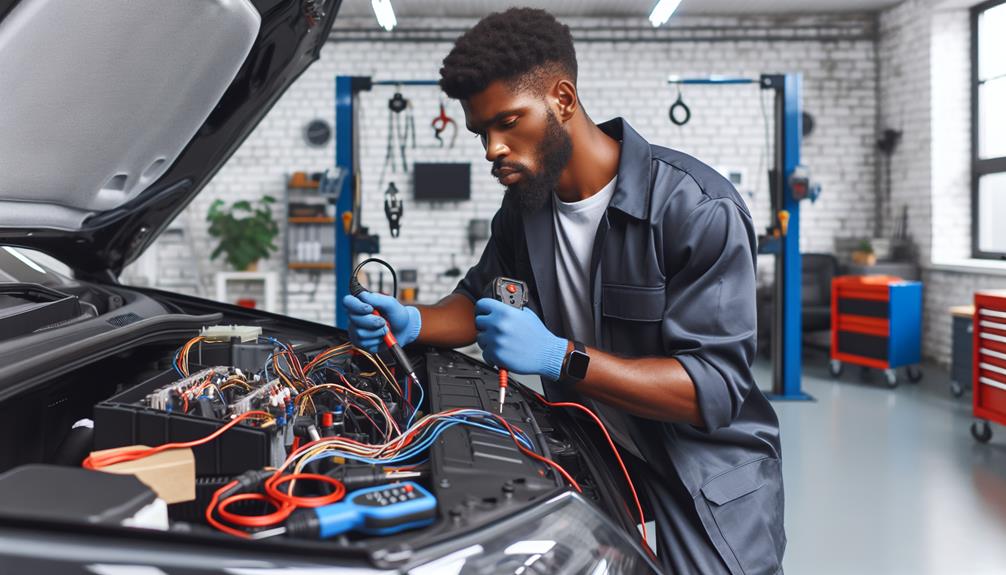You may have heard a few misconceptions floating around when it comes to car electrical system repairs. These myths, though well-intentioned, can often lead to unnecessary frustration and even more costly issues down the road.
But fear not, as we are here to shed light on the truth and debunk some of the most common car electrical system repair myths. So buckle up and prepare to uncover the real facts behind these widespread misconceptions.
Key Takeaways
- DIY electrical repairs can be dangerous and complicated, and should be approached with caution.
- Jump-starting a car is only a temporary solution and won't fix underlying electrical problems.
- Simply replacing the battery may not resolve all electrical issues in a car's complex system.
- Ignoring warning lights can compromise safety and lead to more expensive repairs in the long run.
Common Myth: DIY Electrical Repairs Are Easy
Contrary to popular belief, DIY electrical repairs aren't as easy as they may seem. Many people have the misconception that with just a little knowledge and a few tools, they can tackle any electrical repair in their homes. However, this is far from the truth. DIY electrical repairs can be dangerous and complicated, requiring a deep understanding of electrical systems and safety protocols.
One common misconception is that DIY electrical repairs can save you money. While it's true that hiring a professional electrician can be expensive, attempting to fix electrical issues on your own can lead to costly mistakes and even property damage. Electrical systems are intricate and delicate, and a simple error can cause short circuits, electrical fires, or even electrocution.
Another misconception is that DIY electrical repairs are easy to learn. While there are plenty of resources available online, such as tutorials and videos, these can only provide a basic understanding of electrical work. Without proper training and experience, it's easy to make mistakes or misinterpret instructions, leading to hazardous situations.
Common Myth: Jump-Starting a Car Solves All Electrical Issues
If you believe that jump-starting your car can solve all electrical issues, think again. While jump-starting can be a temporary solution for a dead battery, it won't fix underlying electrical problems. Here are three reasons why jump-starting alone isn't a cure-all for electrical issues:
- Alternator malfunction: The alternator is responsible for charging the battery while the engine is running. If the alternator is malfunctioning, jump-starting your car may provide enough power to start the engine, but it won't address the root cause of the issue. Without a properly functioning alternator, the battery will continue to drain, eventually leaving you stranded again.
- Vehicle wiring issues: Electrical problems in a car can often be traced back to faulty or damaged wiring. Jump-starting may temporarily power up the vehicle, but it won't fix any issues with the wiring system. Faulty wiring can cause a range of problems, from intermittent electrical failures to complete system failures. A professional inspection and repair are necessary to resolve these issues.
- Hidden electrical faults: Jump-starting a car can mask hidden electrical faults, making it harder to diagnose and fix the root cause of the problem. These hidden faults can lead to recurring issues and potential safety hazards if left unaddressed.
Common Myth: Replacing the Battery Fixes All Electrical Problems
Replacing the battery alone doesn't resolve all electrical problems in a car. While a failing battery can cause electrical issues, it isn't always the root cause. It's important to understand that a car's electrical system is complex and consists of various components that work together. Ignoring other potential causes and assuming that replacing the battery will fix all problems can lead to further damage and unnecessary expenses.
To properly diagnose and address electrical problems, it's crucial to look for signs of a failing electrical system. These signs may include dim lights, issues with starting the vehicle, intermittent power loss, or a malfunctioning alternator. Conducting regular battery maintenance can also help prevent electrical problems. This includes cleaning the battery terminals, checking the battery's fluid level, and ensuring proper cable connections.
If you're experiencing electrical issues in your car, it's recommended to consult a professional technician. They've the expertise and tools to accurately diagnose the problem and provide the appropriate solution. Remember, replacing the battery might be a necessary step, but it isn't a guaranteed fix for all electrical problems. By addressing the actual cause of the issue, you can avoid further complications and ensure the proper functioning of your car's electrical system.
Common Myth: Ignoring Warning Lights Is Safe
Continuing our exploration of common myths surrounding car electrical system repair, it's important to address the misconception that ignoring warning lights is a safe practice. Many drivers believe that these lights are mere suggestions and can be disregarded without consequence. However, this is far from the truth. Ignoring warning lights can have serious implications for both your safety and the health of your vehicle.
Here are three key reasons why ignoring warning lights isn't a safe practice:
- Safety Compromised: Warning lights are designed to alert you to potential issues with your car's electrical system. Ignoring these warnings can put your safety at risk. For example, a lit ABS (Anti-lock Braking System) light could indicate a malfunction that could affect your ability to brake effectively. Ignoring this warning could lead to accidents or loss of control while driving.
- Increased Damage: Ignoring warning lights can exacerbate existing problems in your car's electrical system. For instance, a lit check engine light could indicate issues with your engine's performance, which, if left unaddressed, could lead to more extensive and costly repairs down the line.
- Expensive Repairs: Ignoring warning lights can result in more expensive repairs. What might start as a minor electrical issue can escalate into a major problem if not addressed promptly. By ignoring warning lights, you run the risk of incurring higher repair costs.
Common Myth: All Electrical Issues Require Expensive Repairs
Many drivers mistakenly believe that all electrical issues in their car require expensive repairs. This is a common myth that can lead to unnecessary expenses and frustration. While some electrical problems can be costly to fix, not all issues require a significant investment. In fact, there are several car electrical system maintenance practices and signs of electrical issues that can help you save money in the long run.
Regular maintenance is key to preventing electrical problems in your car. By keeping your battery terminals clean and tight, checking the condition of your cables, and inspecting your fuses regularly, you can avoid potential issues. Additionally, paying attention to warning signs such as dimming headlights, flickering interior lights, or a malfunctioning radio can help you identify electrical problems early on.
It is important to remember that not all electrical issues are complex or require expensive repairs. Sometimes, the problem may be as simple as a blown fuse, a loose wire connection, or a faulty switch. By consulting with a reliable mechanic and getting a proper diagnosis, you can determine the best course of action and potentially save money on repairs.
Frequently Asked Questions
Are There Any Electrical Repairs That Can Be Safely Done by a Non-Professional?
You may wonder if DIY electrical repairs on your car are safe for non-professionals. While some tasks like changing a fuse or replacing a battery are relatively simple, it's best to consult a professional for common car electrical problems.
What Are Some Signs That a Car's Electrical System May Be Malfunctioning, Other Than Warning Lights?
If your car's electrical system is malfunctioning, be on the lookout for signs like dimming or flickering lights, electrical accessories not working properly, and strange smells or smoke from the system.
Can a Car's Electrical Issues Be Caused by Something Other Than the Battery?
A car's electrical issues can be caused by various factors other than the battery. Common causes include faulty alternator, wiring problems, or a malfunctioning starter motor. Troubleshooting steps can help pinpoint the exact issue.
Is It Possible for a Car's Electrical System to Have Intermittent Issues, Where It Works Fine One Moment and Then Suddenly Malfunctions?
Yes, it is possible for a car's electrical system to have intermittent issues. Troubleshooting car electrical problems can help identify the root cause, which may include faulty wiring, loose connections, or a malfunctioning component.
Are There Any DIY Methods or Temporary Fixes That Can Be Used to Address Minor Electrical Issues in a Car?
You can use temporary fixes or common DIY methods for minor car electrical issues. These methods provide short-term solutions, but it's important to remember they are not permanent fixes and may require professional repair.
Conclusion
So remember, when it comes to car electrical system repairs, don't fall for the common myths that may lead you astray.
DIY repairs may not be as easy as they seem, and jump-starting a car won't solve all electrical issues.
Simply replacing the battery may not fix all problems, and ignoring warning lights is far from safe.
Lastly, not all electrical issues require expensive repairs.
Don't let these myths steer you in the wrong direction; trust a professional for accurate solutions to keep your car running smoothly.
- How to Easily Turn off Interior Lights in Volkswagen Tiguan 2021 - May 12, 2024
- How to Easily Defog Windshield Without AC: Quick Solutions - May 12, 2024
- How Big is 1.2 Cubic Feet: The Ultimate Guide to Measuring Volume - May 12, 2024


